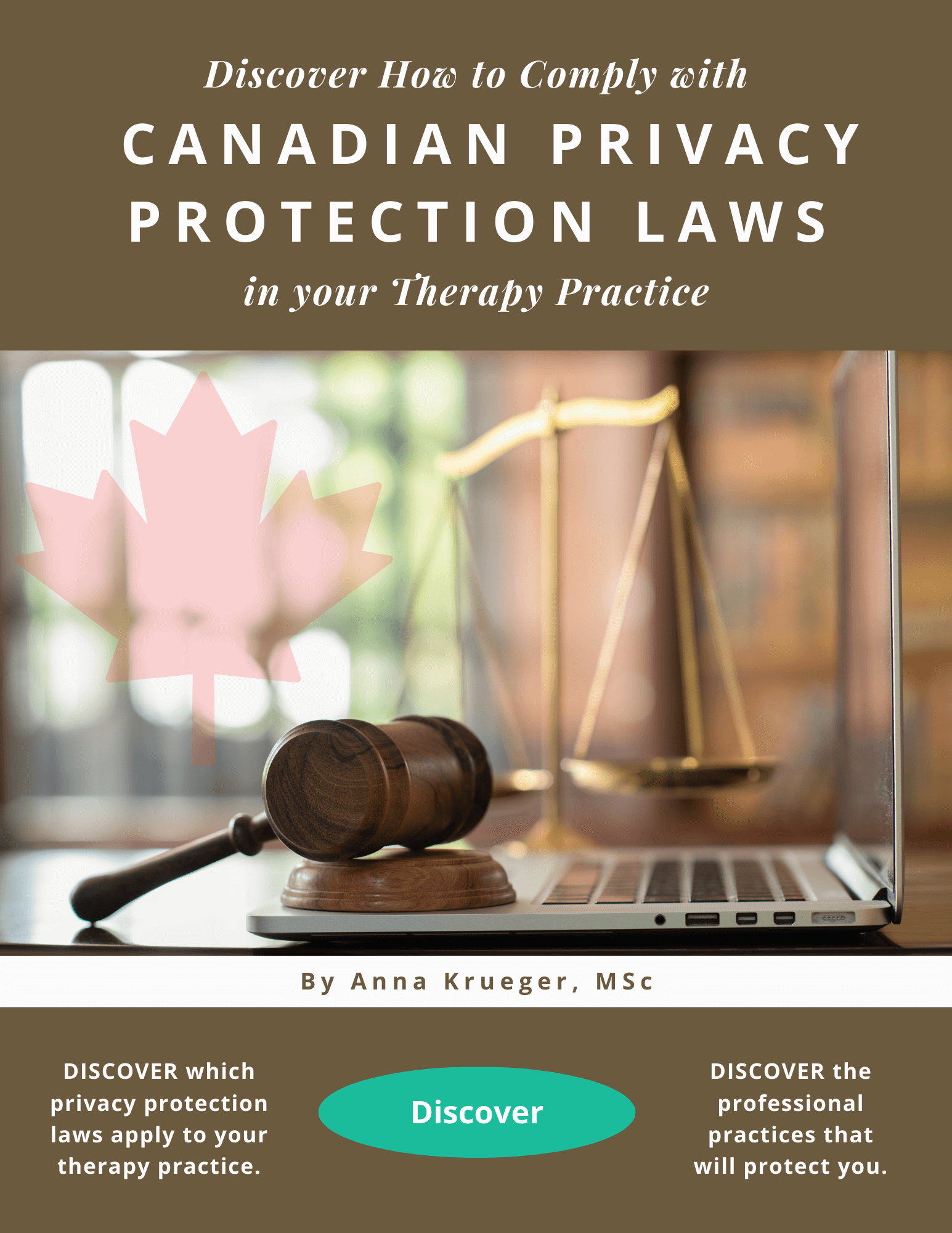
Privacy protection laws apply when a therapist is sending out marketing messages.
Q: If I collect leads using an online form on a website, where does that data go?
As a service provider, you will collect leads from the public. If you use an online form, the data entered on such forms goes to the server that is hosting your website, or to the server hosting your form builder app. It is possible to store this data on a server in Canada if you choose your software and apps carefully.
If you use Google apps or surveys, for instance, all the information your leads have entered on your forms will be processed by US based servers.
Q: How do I protect the data I am collecting on my website?
People will be reluctant to use your online form if your site is not secure. This is revealed to the public in the URL by a lock icon and then https://. If your website doesn’t have this yet, contact your hosting company to upgrade to a higher level of security.
HTTPS provides what is called "encryption in transit". This means that the data and communications between a browser and website server are in an encrypted format, so if these packets of data are intercepted, they cannot be read or tampered with.
Q: Can I send out bulk email campaigns or newsletters?
It is not legal to send advertising messages to people who don’t want to hear from you. The very first step is to build a robust list of names and email addresses. These leads should be people who have filled in an online form or interacted with you or your business.
Email programs like Gmail or Outlook work best if the person you are emailing already has your email address in their list of contacts. Your message will reach the person’s inbox.
If you try to use your regular email program to reach a group of people, you will be limited to a small number of recipients. If you try to send to more people, you may get blocked from sending emails. These email programs are not designed for sending bulk campaigns to a large group of people.
You should use a bulk email program to send news and offers to the public. You can also create drip campaigns and automatic responses using this type of email software. Properly formatted email campaigns have an unsubscribe link. You should also provide a link with some identifying information about your business. If these two links are missing from your email campaigns, your messages with be identified as SPAM.
I recommend the AttractWell platform for therapists who want their website, marketing and online curriculum to be integrated. You don't need to waste time entering names and email addresses. That information is automatically stored in the contact list in your dashboard. You can send out single messages, bulk campaigns and customized campaign sequences using domain name email.
Free 30-Minute Workshop for Private Practice Therapists!
- Discover the three biggest website mistakes made by private practice therapists
- Walk away with an understanding of the changes you need to make to your website
- Feel confident about being an entrepreneur, finally having a vision for a strategic website that will help you build your therapy practice
"After this workshop, I finally started thinking about the FUNCTION of my website, not just the look."
More of...
- Referrals
- Confidence
- Ease & Balance
Less of...
- Inefficiency
- Frustration
- Low Income


Privacy protection applies to all the interactions that therapists have with the public during the marketing phase.
Q: What is the difference between personal information and protected health information?
Personal Information (PI): Any recorded information, other than contact information, that uniquely identifies you is considered personal information. This includes your name, age, sex, race, religion, sexual orientation, disability, fingerprints or blood type. It also includes information about your health care, educational, financial, criminal or employment history. It also includes anyone else's opinions about you and your own views or opinions.
Protected Health Information or Personal Health Information (PHI): PHI generally includes demographic information, medical histories, test and laboratory results, mental health conditions, insurance information, and other data that a healthcare professional collects to identify an individual and determine appropriate care.
Q: Is there a Canadian law that is like HIPAA in the US?
Personal Information Protection and Electronic Documents Act (PIPEPA): In Canada, the federal law which gives people a right to access their personal information is PIPEDA. It requires organizations to obtain individuals’ consent to the collection, use or disclosure of their personal information. This law is more similar to the European GDPR law than it is to HIPAA because it applies to all personal information, not just health information.
If you don't have my free e-book yet, click on the image for more information.
As an online service provider in Canada, you are required to comply with PIPEDA. When you obtain personal information about a potential client, you are expected to protect that information with three types of safeguards:
- Administrative safeguards identify all written, spoken or electronic PI and prevent that information from being shared with people who should not have access to it. For example, a consent form for the release of information is an administrative safeguard.
- Physical safeguards like locked doors and employee badges prevent unauthorized people from being able to access workstations and electronic media.
- Technical safeguards, like user IDs, passwords and data encryption, keep the data hidden until an authorized recipient opens it.
In Canada, we have provincial privacy laws that are more stringent than our federal laws. Note that there is no federal law requiring Canadian service providers to keep their data on servers in Canada.
Q: How is HIPAA similar to PIPEDA?
Health Insurance Portability and Accountability Act (HIPAA): This US law applies specifically to health information. The purpose of HIPAA is to improve efficiency in the healthcare industry, to improve the portability of health insurance, to protect the privacy of patients and health plan members, and to ensure health information is kept secure, and patients are notified of breaches of their health data. Code sets are used along with patient identifiers, which helps with the efficient transfer of healthcare data between healthcare organizations and insurers, streamlining eligibility checks, billing, payments, and other healthcare operations.
HIPAA and PIPEDA have similar requirements for privacy protection, specifically the need for administrative safeguards, physical safeguards and technical safeguards.
Free 30-Minute Workshop for Private Practice Therapists!
- Discover the three biggest website mistakes made by private practice therapists
- Walk away with an understanding of the changes you need to make to your website
- Feel confident about being an entrepreneur, finally having a vision for a strategic website that will help you build your therapy practice
"After this workshop, I finally started thinking about the FUNCTION of my website, not just the look."
More of...
- Referrals
- Confidence
- Ease & Balance
Less of...
- Inefficiency
- Frustration
- Low Income


Qualifying leads helps therapists find the right clients.
If a visitor to your website provides their contact information, that person becomes a lead. Qualifying leads is a marketing phrase that refers to using a screening procedure to eliminate all the wrong leads and only keep the right ones. If you want clients who are interested in asynchronous therapy, it's important to explain your service model on your website. Don't confuse the public. Use common language to explain your services. Try using online service delivery.
Q: What if my prospects are not aware of the benefits of asynchronous therapy? What if they want face to face services?
In your marketing, explain the benefits of your approach:
Safety: During a health crisis, online service delivery is a safe option.
Flexible scheduling: People with busy or complicated schedules can still get therapy.
Expertise: Clients can get expert help which is not available locally. Less experienced members of the intervention team can be mentored.
Access: People in remote locations can be well supported. People who don’t drive can access therapy.
Efficiency: Sessions will take place consistently. None of the funding is wasted on travel costs.
I teach private practice therapists how to manage their own website, marketing and curriculum using the AttractWell platform. You can create a page on your website with frequently asked questions about your service model. You could write a short blog post for each of the benefits of your online services. If you create this type of content for your website, people searching for asynchronous therapy will find your website. In other words, you can use inbound marketing to pull ideal leads toward your business.
Q: Is asynchronous therapy a good option in all cases?
No. Some people don’t meet the three basic requirements for asynchronous therapy:
- A strong high-speed Internet connection.
- A computer or tablet with a webcam.
- Computer skills or a reliable helper with the necessary skills
Offer a screening consult by webcam to probe for these three prerequisites. If people experience problems during the initial consult, they immediately become aware of the limitations and they make some decisions.
If you are wasting a lot of time trying to find clients who are a good fit for asynchronous therapy, consider changing your marketing. You should have some way to direct people to other services so that you don’t collect inappropriate referrals.
All your communication with leads, referral sources and prospects should be consistent and clear so that you don’t collect inappropriate referrals.
Free 30-Minute Workshop for Private Practice Therapists!
- Discover the three biggest website mistakes made by private practice therapists
- Walk away with an understanding of the changes you need to make to your website
- Feel confident about being an entrepreneur, finally having a vision for a strategic website that will help you build your therapy practice
"After this workshop, I finally started thinking about the FUNCTION of my website, not just the look."
More of...
- Referrals
- Confidence
- Ease & Balance
Less of...
- Inefficiency
- Frustration
- Low Income










